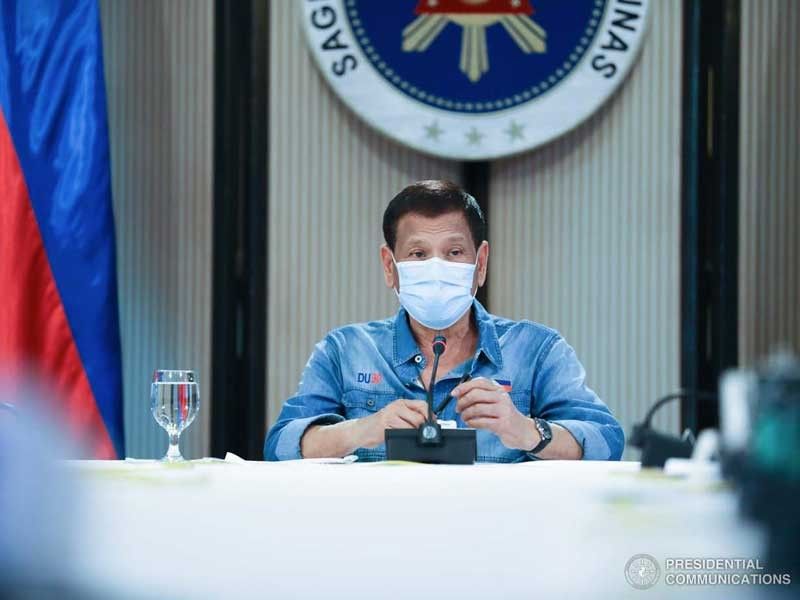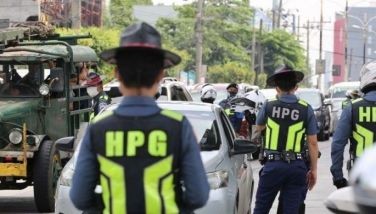Duterte won't name lawmakers involved in corruption, says he has no authority

MANILA, Philippines — President Rodrigo Duterte will not name the lawmakers who are allegedly benefiting from corruption in government projects, saying he cannot probe members of a separate and co-equal branch of government.
The Presidential Anti-Corruption Commission (PACC) claimed last month that some lawmakers are using their influence to control the implementation of local projects and are colluding with public works personnel and contractors to commit corruption. PACC Commissioner Greco Belgica has declined to provide specifics but has vowed to submit the list of lawmakers to Duterte.
Speaking during a meeting of the government's pandemic task force last Monday, Duterte, who has vowed not to tolerate even a whiff of corruption, confirmed that the PACC has informed him about the list of lawmakers who are supposedly asking commissions from project contractors. The president, however, said he could not investigate the lawmakers because it would be an encroachment of the separation of powers.
"Let’s go to political law. I have no business investigating congressmen. They belong to a separate organ of government, which is co-equal with the President and the Supreme Court," Duterte said.
"If I cannot investigate the congressmen, then I have no authority to be releasing their names that are involved per investigation by the PACC," he added.
If the list is given to him, Duterte said he would have no other recourse but to send it to the ombudsman because it is "the only investigating agency that has jurisdiction over congressmen."
Justice Secretary Menardo Guevarra, who was present during the task force's meeting in Davao City, pointed out that a lawmaker is not the one being investigated but a transaction involving any government personnel who is outside the executive branch. If a transaction is probed and in the course of the investigation, some members of Congress are found to be involved in a corrupt practice or transaction, it is within the power of the investigating body to mention them, Guevarra added.
Duterte said all individuals involved in corrupt practices including contractors should be investigated.
"We cannot have a separate (probe) because of the findings.... Well, for example, we have jurisdiction over the contractor, and then there's the congressman... The decision may be different. Maybe exonerating the congressman or exonerating the contractor and making the congressman liable," the president said.
"If the transaction is germane to the particular congressman, that's his. He should answer for that... Now, whether or not, they can themselves independently of me release the names, I said, no. Just send the list to me, the result of the investigation, then I will give it to the Secretary of Justice, to Secretary Guevarra, for him to make the proper endorsement to the Ombudsman."
Duterte clarified that he was not protecting anyone when he decided not to reveal the lawmakers involved in corruption.
"I am not afraid and I am not covering up for a congressman.... Now when the time comes, I will ask the secretary of justice to review it. But the review will just be a cursory reading...because...he does not have the jurisdiction either, he will pass it on to the Ombudsman," he said.
Different from the narco list?
Duterte, however, had disclosed the names of officials believed to be involved in illegal drugs trade even if they are not part of the executive branch. In 2016, the president made public a "narco list" that contained the names of judges and lawmakers.
Asked how different the "narco list" was to the list of lawmakers who are receiving kickbacks from government projects, Roque claimed it is easier to establish the wrongdoing of those who were into illicit drugs.
"I think it’s evidentiary. The president said because this is an issue of evidence, it would be better if the investigation is conducted by the ombudsman because the jurisdiction of the ombudsman covers all people in government, not just the executive, legislative or judiciary," Roque said.
"When it comes to the judges, perhaps the president himself saw the pieces of evidence against the judges as a former prosecutor. It's easy. If there is evidence proving an allegation that a judge received a bribe to acquit a drug lord, the president thinks that evidence will stand," he added.
Roque said several pieces of evidence are needed to prove that biddings were rigged to favor a contractor backed by a lawmaker.
"The president does not possess these pieces of evidence unlike the evidence that a judge received a bribe, which is easy to establish," the Palace spokesman said.
"So I can only surmise na it is evidentiary; and number two, he stands by what he said that this entails separation of powers."
Pressed which instances can the president investigate lawmakers, Roque said it can be done if the offenses are "not within the primary jurisdiction of the Ombudsman."
"When it entails, for instance, heinous crimes involving violations of the Anti-Drugs law of the country, then the Executive can of course investigate that," Roque said.
"We lawyers tend to have specializations and even fiscals, prosecutors also have specializations. We have special prosecutors for Anti-Graft law, these are the Ombudsman lawyers; we have specialized prosecutors for drugs, we have specialized prosecutors for trafficking. The more experienced you are with the field of law, the higher the conviction rate," he added.
Roque also defended Duterte's public statements against opposition Sen. Leila de Lima, who is now in jail over drug-related charges.
"Well, as I said, it must be evidentiary. In the case of Leila de Lima, the evidence is strong that she was really involved in the drug trade. Eleven witnesses testified against her," the Palace spokesman said.
"As lawyers, you can evaluate evidence for yourself. The president is a former public prosecutor. Leila de Lima's liability when it comes to illegal drug trafficking is brighter than the sun," he added.
Roque also pointed out that the Office of the President cannot probe more than 300 lawmakers.
"As for Leila De Lima, she is one of a kind," he added.
In a tweet, de Lima said Duterte should review his political law, saying the justice department and the National Bureau of INvestigation probed the pork barrel complaints against Sen. Ramon Revilla, Jr. and former senators Jinggoy Estrada and Juan Ponce Enrile.
Asked to react to the statement, Roque replied: "Let her be. She has no one to talk to."
- Latest
- Trending


























